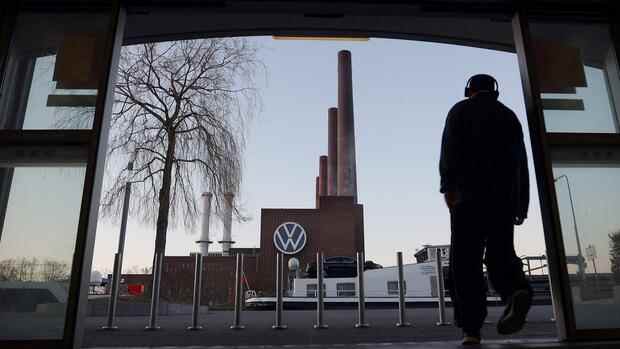Volkswagen power plant in Wolfsburg: The many crises in the world are forcing Europe’s largest car manufacturer to save.
(Photo: Bloomberg)
Wolfsburg Volkswagen’s core brand has to save. There is no other way to compensate for the massively rising costs: raw materials, gas and electricity are becoming more and more expensive. Because of the war in Ukraine, important components are missing, and parts of the production have come to a standstill. In addition, China, VW’s most important sales market, is currently experiencing a new wave of corona infections.
The CFO of the Volkswagen Passenger Cars brand, Alexander Seitz, has therefore announced new cost-cutting measures. “There is not one key, we need a complete toolbox with various measures,” he said in an interview with the Handelsblatt. The crisis experiences from the past two years with the corona pandemic and the lack of chips should also help.
The VW core brand achieved an improved result in 2021 despite the chip crisis. The number of car deliveries fell by a good 400,000 to 4.9 million. However, the Wolfsburg-based company was able to increase the operating profit more than fivefold to around 2.5 billion euros. The return rose from 0.5 to 3.3 percent.
Fixed costs were more than a billion euros below the level of 2019, before the start of the corona pandemic. Patrick Hummel, automotive analyst at the major Swiss bank UBS, also confirms: “Fixed costs are developing well.”
Top jobs of the day
Find the best jobs now and
be notified by email.
In the year 2022, the Wolfsburg started cautiously. According to Chief Financial Officer Seitz, it is “a matter of forward-looking and economical volume control” in vehicle production. The company must set itself a cost-optimized production target. VW does not want to sell more cars at any price, but above all wants to place higher-quality vehicles in the right sales channels.
Volkswagen wants to save on staff and invest cautiously
The VW manager also wants to save on staff. Two years ago, at the beginning of the corona pandemic, Volkswagen introduced the “level freeze”, which hardly allows new hires from outside the company. VW board member Seitz intends to maintain this cautious personnel policy this year. There should only be new hires in areas with a strong future orientation, such as IT and software.
Volkswagen also remains cautious when it comes to new investments. Seitz said that Volkswagen invested a good 15 percent less last year than in 2020. The investment volume reached the level of 2008 and 2009.
Large and central investment projects such as the planned “Trinity” car factory in Wolfsburg are not affected. Seitz wants to concentrate on investment projects that quickly bring money into the company’s coffers.
The Wolfsburg core brand is planning further cost reductions in marketing. “In terms of marketing, we will address our customer groups even more specifically,” announced Chief Financial Officer Seitz. Every car is no longer advertised to the usual extent. Volkswagen wants to focus on certain models, such as the new electric transporter ID.Buzz. Comprehensive discount campaigns and sales discounts will also only be available to a lesser extent.
Less nickel, higher prices
The only way Volkswagen can change the sharply rising raw material costs is in the purchasing quantity. A particular example of this is nickel, which is used in batteries in electric cars. For this metal alone, Volkswagen incurs costs of around 1,000 euros per battery. The Wolfsburg-based company therefore wants to reduce the nickel content in the batteries.
In addition, Volkswagen is pursuing a broader raw materials strategy in which, for example, lithium iron phosphate batteries without cobalt and nickel also play a role. Seitz said: “We need a plurality of technologies.”
>> Read here, how differently the Volkswagen subsidiaries closed the past year.
Volkswagen had increased sales prices in Germany twice in the past year. Seitz does not want to rule out that this will happen again in the foreseeable future. “At some point this will have to be discussed,” he emphasized, “after the exact situation of the effects of the war has been surveyed and all possible cost potentials have been explored.”
Seitz gave the all-clear for the cable harnesses, which suppliers no longer delivered to Volkswagen from their Ukrainian plants to the usual extent after the outbreak of war. “We can already partly compensate for this with deliveries from Morocco and Romania,” said Seitz.
Volkswagen hopes for a quick end to the war in Ukraine. The longer the war lasts, the more serious the upheavals in the entire economy could become. Then Volkswagen would be threatened with further savings efforts. “However, we further strengthened our resilience in 2021, which is of crucial help to us in this situation in particular,” concluded CFO Seitz.
More: Automakers help suppliers relocate production.
